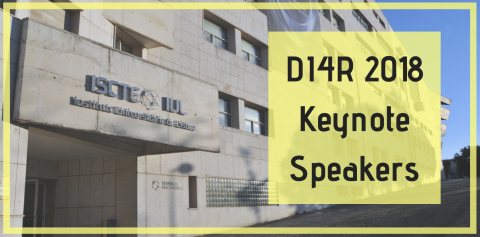- Online Submission: The call for abstracts is closed
- Submission Deadline: Thursday, 5 July 2018
- Abstract Word Limit: 300 (minimum)~500 (maximum) words
- Acceptance Notification to Authors: Friday, 20th July 2018
Theme: Challenges for Research Communities around Open Science
The third Digital Infrastructure for Research Conference (DI4R 2018) is to be held in Lisbon, 9th to 11th October. It will be hosted by the LIP, and organised jointly by EOSC-hub, GÉANT, OpenAIRE and PRACE. DI4R 2018 will showcase the policies, processes, best practices, data and services necessary for the support of the research process to ultimately advance scientific knowledge through and open science. Researchers, innovators, data producers, scientific domain experts, librarians, data science practitioners, service providers, project leaders, policy makers and funders, are invited to bring their voice to DI4R 2018. Following the previous DI4R events, the conference will be an opportunity to report and discuss requirements, existing solutions and success stories that highlight the relevance of open science and its enabling building blocks. By bringing together many different stakeholders, the conference will foster cooperation between infrastructure projects, communities and initiatives.
All open science players are invited to send proposals for contributions on requirements, developments, success stories and gap analyses in the form of
- Presentations (15 minutes talk + 5´ discussion)
- World Cafe sessions (1.30 h). Workshop style session addressing community based solutions, e-infrastructure design, and technical solutions oriented to remove user adoption barriers.
- Training sessions (1h30m)
- “Provocations” session (30 minutes). A debate led either by a single speaker, or as a ‘head-to-head’, that is two co-speakers and a moderator, resulting in active participation with targeted feedback and ideas from an expert audience on a given topic. “Provocations” type of session (http://ieec.co.uk/provocations/)
- Lightning Talks (7 minutes strictly timed talk)
- Posters
- Demos: a maximum of 9 demos will be allocated (3 Booths x 3 Days)
The Program Committee will promote those presentations that are found especially interesting to become “insight”/”in-depth” presentation of 30` minutes length.
We also foresee a “Zapping Session” to showcase in strictly 3 minutes (timed) Posters and Demos in the Plenary auditorium.
Topics of Interest:
We welcome contributions about requirements, solutions, best practices, success stories and ongoing developments in the following topical areas:
- Area 1. Cross-Domain challenges / Data exchange across domains: researchers, technologist
- Area 2. Open Science and skills
- Area 3. Computing and Virtual Research Environments
- Area 4. Security, trust and identity
- Area 5. Digital Infrastructures for EOSC and/or EDI
- Area 6. Business models, sustainability and policies
- Area 7. Innovation in Open Science with SMEs and Industry
Area 1. Cross-Domain challenges / Data exchange across domains: researchers, technologist
- Technology: architectures, platforms, tools, standards and other ICT related initiatives enhancing intra-domain and cross-domain interoperability;
- Data and metadata: promotion and adoption of tools and techniques for cross-standard and cross-format interoperability
- Enablers of interoperable systems within and/or across communities
- Organization: provision of legal and organisational frameworks commons
Area 2. Open Science and skills
The EC’s Open Science Skills Working Group Report defines Open Science skills as needs for researchers to be able to publish under open access, to manage (open) data, to conduct professional research and engage with citizen science (http://ec.europa.eu/research/openscience/index.cfm). These Open Science skills follow the research life cycle and cover design and setting up research data, data production, management, analysis, open access publishing and other ways to act in and beyond one’s own scholarly and disciplinary community, up to interaction with the general public to enhance the impact of science and research. The list of topics you can contribute to are:
- What Open Science training is already available, what is needed to share this expertise?
- How can training be implemented in the curriculum of (young) researchers? Are there best-practices? What could or should be the role of universities and research funders?
- How can we raise awareness among researchers (in all career stages) on Open Science practices and behaviour?
- To what extent – and how – can we provide training for professional support staff for researchers (data stewards, IT technicians, data scientists, legal experts, discipline specific data managers and librarians)?
- How can we realise outreach and connect with professionals and citizens outside academia?
Area 3. Computing and Virtual Research Environments
This area covers innovation and interoperability in scientific computing, and tools and applications for the development, creation and provisioning of scientific applications and Virtual Research Environments (VRE) and their key enabling technologies. We look for contributions addressing distributed data and computing intensive research based on HTC, HPC, Cloud IaaS, PaaS and SaaS, and community-specific scientific applications and tools. We would like to investigate how research and education can realise the full potential of these. The list of topics is:
- HTC, HPC and cloud computing with big data and active repositories.
- Enabling convenient access to HTC, HPC, cloud, container, data applications and collaborative services.
- Applications with extreme demands for compute and storage requirements - HPC challenge.
- Accelerated computing for data intensive analysis, accelerated computing-as-a-service
- Compute and data interoperability: Requirements, prototypes and solutions for community tools, applications and datasets
- Data transport and networking across e-infrastructures;
- Development and provisioning of innovative VREs: custom environments, data analytics capabilities and discipline-specific that connect and abstract infrastructure resources for discipline-specific data and compute intensive applications.
Area 4. Security, trust and identity
This track will provide the platform to discuss security and trust & identity aspects. It will offer an opportunity for e-infrastructures, research infrastructures and communities to present their experience with IT security management, security policies, best practices, user experience and approaches to support researchers’ needs. We invite representatives from research collaborations and research infrastructures to submit papers about:
- Implementation Guidelines and Validation of current AAI solutions based on the AARC Blueprint.
- Research community based AAI deployments and experiences.
- Trust assessment and interoperability for global collaborations, comparative policy frameworks, and maintaining assurance across identity bridges.
- Gaps in the current services offering
- Risk assessment, security incident response and security operations in a distributed international environment as part of the implementation of an Information Security Management System
- Security in Big and Open Data especially within distributed digital infrastructures
Area 5. Digital Infrastructures for EOSC and/or EDI
The European Open Science Cloud (EOSC) and the European Data Infrastructure (EDI) are two high-level initiatives of the European Commission that are intended to maximise the incentives for sharing, exploit data as widely as possible, across scientific disciplines and between the public and the private sector by interconnecting the existing and the new data infrastructures across Europe. Submissions for this track should report about Digital Infrastructures that deliver science discipline specific and/or generic capabilities for Open Science, and are planning to federate services into EOSC and/or EDI.
The presentations should highlight the opportunities and challenges that the infrastructures see in offering services through the future EOSC & EDI systems. We invite representatives, architects and operators from research infrastructures and research collaborations to submit contributions, covering:
- Experiences with building community-specific, pan-European digital infrastructures
- Expectations, suggestions, opportunities, threats when moving towards EOSC/EDI
Area 6. Business models, sustainability and policies
Long-term access and provisioning of services require clear governance, engagement rules, policies and funding models. European and National coordination, Submissions should focus on the barriers, opportunities and changes in this environment in order to address the non-technical pressures, for example social, financial, legal and policy that influence the present and future opportunities.
- Governance models in the EOSC ecosystem
- Hybrid business models.
- Access policies
- Multi-supply service provisioning of EOSC/EDI building blocks
Area 7. Innovation in Open Science with SMEs and Industry
The purpose of the track is to provide a platform for discussion and exchange of experiences among Research Infrastructures and business organizations to stimulate the innovation potential of research infrastructures, SMEs/industry, and other innovative actors. A list of topics includes:
- Examples of partnerships between Research Infrastructures and SMEs/industry and innovation clusters.
- Prototyping and development of business pilot line for market replication.
- Bringing innovation to investment readiness and maturity for market take-up.
- Sharing experiences on best practices and competencies for knowledge transfer between the public and private sector.



